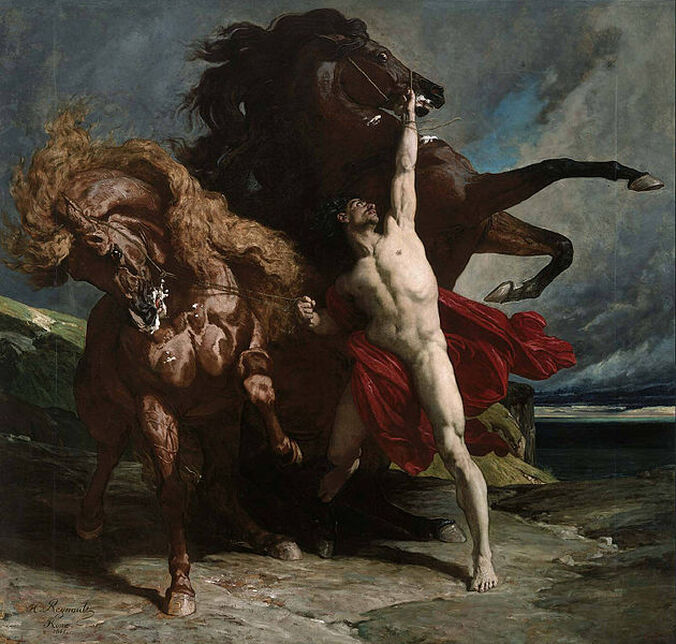AUTOMEDON IN GREEK MYTHOLOGY
Automedon was a member of the Achaean forces who fought during the Trojan war. Automedon appears in Homer’s Iliad, as well as other ancient sources.
Automedon Son of Diores
|
Automedon was not a high-born individual unlike the other Achaean heroes who appear in the Iliad, and although Automedon was named son of Diores, Homer merely calls Automedon a charioteer.
A later source, written by Hyginius, provides Automedon with a more exalted status, claiming in his Catalogue of Ships, that Automedon brought forth 10 ships from Scyros to Troy. |
|
Automedon and Achilles
Automedon might have just been a charioteer, but he was charioteer to one of the greatest Greek heroes, Achilles. It was thus Automedon’s job to yoke up Balius and Xanthos, the two immortal horses of Achilles.
Automedon might have been Achilles’ charioteer, but he also put the best interests of the Achaeans first, for when it appeared Achilles was going to do something rash for his love of Polyxena, Automedon would tell Patroclus and Ajax the Great so that they might keep an eye on Achilles.
Automedon might have been Achilles’ charioteer, but he also put the best interests of the Achaeans first, for when it appeared Achilles was going to do something rash for his love of Polyxena, Automedon would tell Patroclus and Ajax the Great so that they might keep an eye on Achilles.
Automedon and Patroclus
|
Automedon comes to the fore at a time of strife for the Achaeans, for Achilles had withdrawn from the fight. Achilles though allows Patroclus to use his armour and chariot to defend the Achaean ships. Patroclus thus enters the battle with Automedon as his charioteer.
The intervention of Apollo saw Patroclus struck by Euphorbas and then killed by Hector, with Patroclus falling dead from the chariot. Automedon is powerless as Balius and Xanthos run clear of the battle, and despite Automedon’s efforts they would not enter the fray again, for Balius and Xanthos were mourning Patroclus, though Zeus eventually intervenes. |
|
Automedon and Achilles chariot enter the battle again, and Automedon is able to kill Aretos, son of King Priam, with a spear to the gut; Automedon takes Aretos’ armour as a prize.
Automedon and Neoptolemus
Later in the war, Automedon became the charioteer of Achilles’ son, Neoptolemus, and Automedon tells Neoptolemus, that the Deiphobus now facing them, was different to the man faced by Achilles previously, and must be imbued with courage from a god.
In Virgil’s Aeneid, Automedon is present during the sacking of Troy, fighting alongside Neoptolemus and Periphas as the enter the Palace of King Priam. Nothing more of Automedon is said though.
In Virgil’s Aeneid, Automedon is present during the sacking of Troy, fighting alongside Neoptolemus and Periphas as the enter the Palace of King Priam. Nothing more of Automedon is said though.
|
|
Colin Quartermain - Automedon - 26th August 2021
